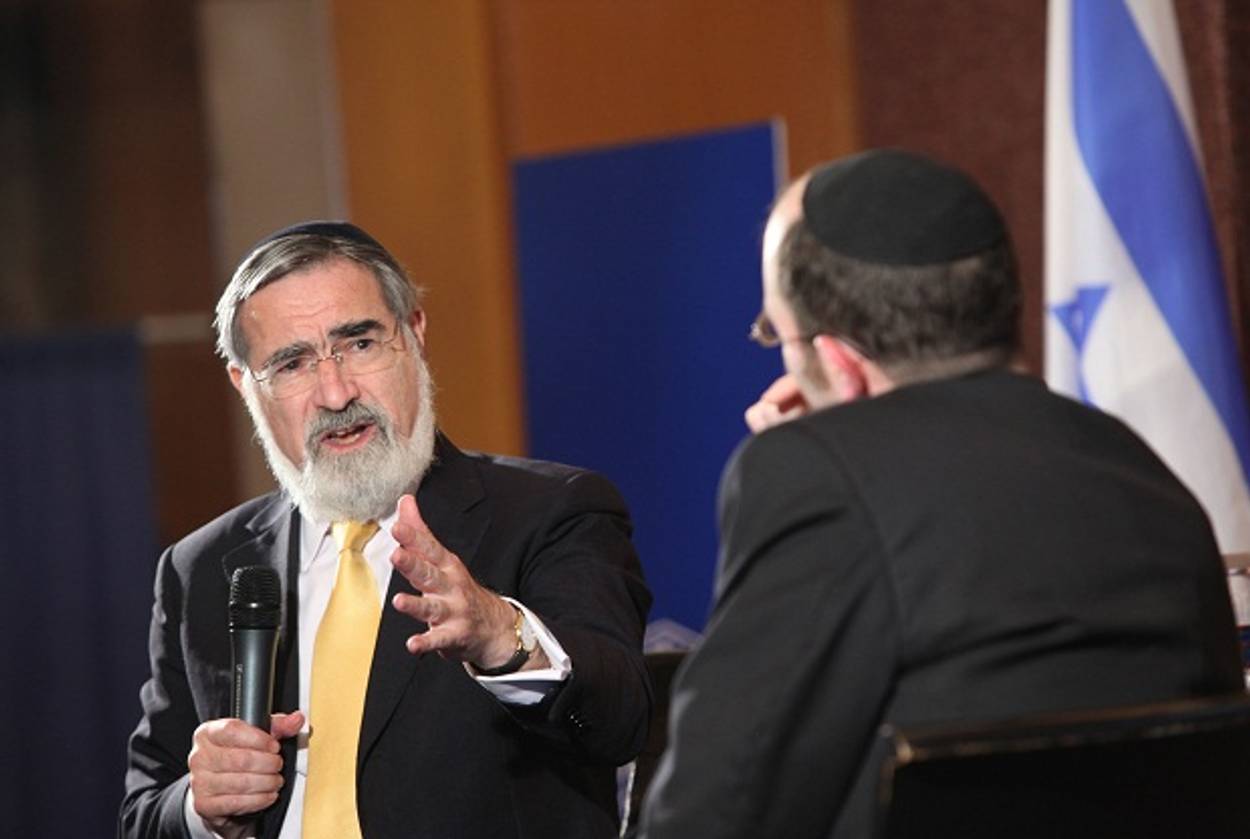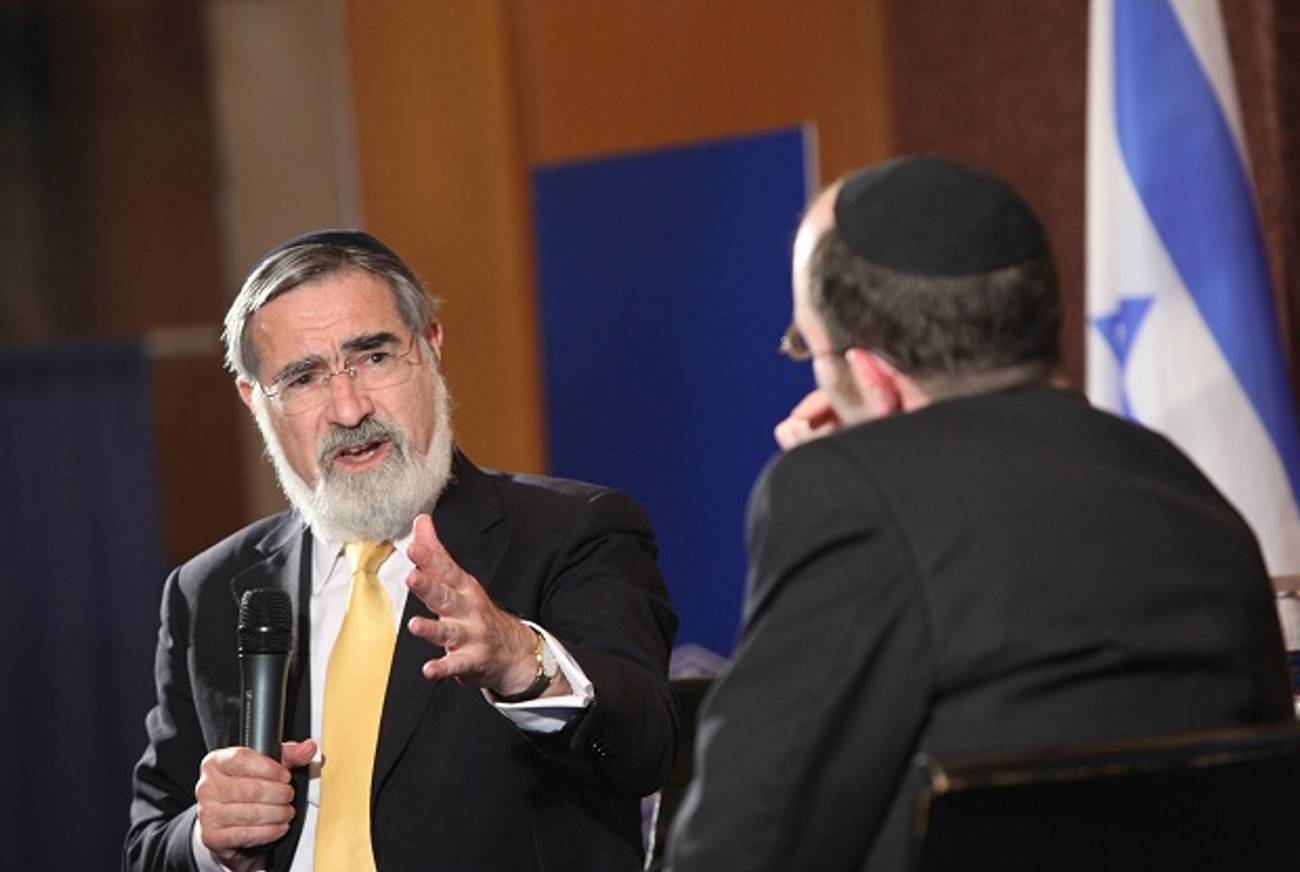UK Chief Rabbi’s Star-Studded Send-Off
Watch Tony Blair, David Cameron & Gordon Brown toast Jonathan Sacks




Monday night, Britain celebrated the tenure of Lord Jonathan Sacks, the Chief Rabbi of the United Kingdom since 1991, who will be stepping down in August. Among the over 800 attendees were past and present government officials, Israel’s ambassador, and representatives of the UK’s non-Orthodox movements. The keynote tribute was delivered by Prince Charles himself, who dubbed Sacks “a light unto this nation.” A Cambridge-educated Modern Orthodox rabbi, Sacks is well-known beyond the confines of Anglo-Jewry through his many books, popular articles and appearances on radio and television. As a respected moral voice and public intellectual, he has advised the past four British prime ministers, each of whom offered a video tribute aired at the gathering.
“When you were in Downing Street a few weeks ago,” recalled Prime Minister David Cameron, “I introduced you to Prime Minister Netanyahu and, without thinking, I described you as ‘my rabbi.’ It was a symbol of the impact that you have had on this country far beyond the Jewish community. Because over the past two decades you have been not just a leader for Jewish people but for all of us.”
“How do you sum up someone who is the greatest scholar you know, the greatest philosopher, the greatest writer you know, one of the greatest thinkers in the world?” asked former British PM Gordon Brown (who wrote the foreword to Sacks’s 1997 book, The Politics of Hope). “It’s this: that he was always and has always been ahead of his time.” Added Tony Blair, “He’s an intellectual giant. He is somebody who … has made an extraordinary, outstanding contribution, not just to British and International Jewry, but to British and International public life.”
Which isn’t to say the evening was a purely platitudinous affair. Sacks took the opportunity to lay out his own pointed appraisal of the “dangerous” position of contemporary Judaism. “Today, two phenomena dominate the Jewish world,” he said. “The first is continuing assimilation and out-marriage. Throughout the Diaspora, on average one young Jew in two is deciding not to have a Jewish marriage, create a Jewish home and build the Jewish future. A chain of continuity that has lasted for 100 generations will end with them, and that is a tragedy.”
“The second, in the opposite direction, is the growth of what in Israel is called the Edah Haredit or what some people call ultra-orthodoxy, the orthodoxy that segregates itself from the world and from its fellow Jews. So the two fastest growing elements in the Jewish world are those who embrace the world and reject Judaism, and those who embrace Judaism and reject the world.”
The Chief Rabbi did not mince words about these trends. “I have to tell you this is worse than dangerous. It is an abdication of the role of Jews and Judaism in the world. We are here to engage with the world, to be true to our faith and a blessing to others regardless of their faith. That is the Judaism you and I believe in.” Sacks pledged to work to foster that spirit after stepping down as Chief Rabbi. “I want to inspire young Jews throughout the world to believe in and live a Judaism that is tolerant, inclusive, embracing, non-judgmental; that is intellectually open and ethically uplifting; that is neither defensive nor arrogant, but that lives the life of faith in such a way as to enhance the life of others within and beyond the Jewish community.”
Sacks further outlined his intentions in a pamphlet entitled “A Judaism Engaged with the World,” which was distributed to everyone in attendance. You can download it here, as well as watch the tribute reel from the evening’s festivities–featuring the past four prime ministers of Britain, as well as the Archbishops of Canterbury and Westminster–below:
Yair Rosenberg is a senior writer at Tablet. Subscribe to his newsletter, listen to his music, and follow him on Twitter and Facebook.